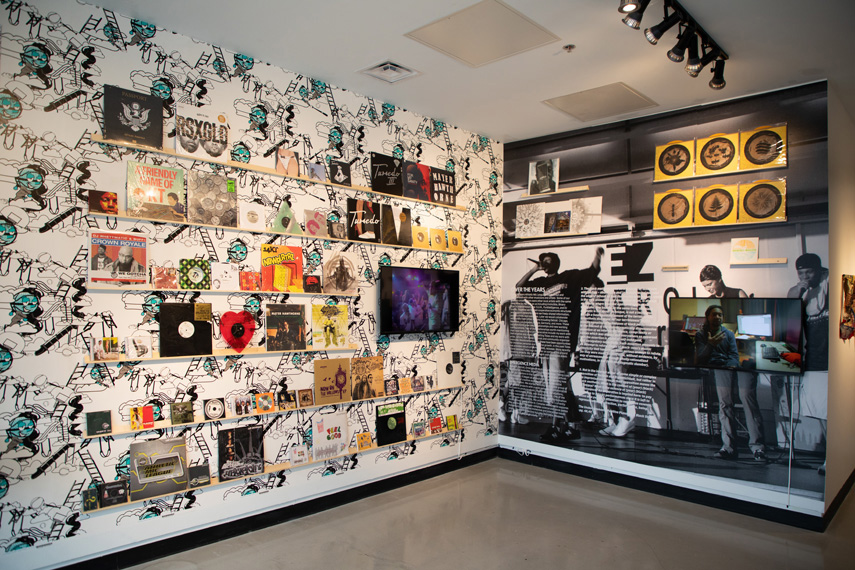
Wes Taylor (BFA ’04), Ann Arbor Undercommons, 2020, Installation detail. Lead Archivist Jamall Bufford with assistance from Athletic Mic League. Photo: Nick Beardslee
The MFA’s and BFA’s produced each year by the nation’s academic art programs far exceed the ability of the art establishment–fine art galleries, museums, collectors and the like–to absorb them. What happens to all those aspiring and hopeful young creatives upon graduation? How do contemporary artists pay rent and continue to work in a world that doesn’t reliably support them financially? The exhibit Story Word Sound Sway, at the Stamps Gallery from now until February 28, provides a provocative answer of sorts.
Their creative paths as artists are as varied as the individuals–all graduates of the Penny Stamps School of Art and Design–now showing their work in the gallery. Contributions range from highly personal performance-based videos to political activism to graphics to object/image making. Many of the artworks in the gallery represent ongoing projects intended to engage multiple audiences at varying levels of sophistication and in diverse settings, all the while answering in real time the question of how contemporary artists continue to exist and even thrive.
The show, co-curated by Jennifer Junkermeier-Khan and Moteniola Ogundipe, allocates an outsize role to performance-related materials. I counted nearly a dozen time-based artworks, which collectively run to more than 90 minutes, throughout the show. This abundance of content made it challenging–okay, impossible–to experience all of them during the limited time of 25 minutes it was recommended that viewers be in the gallery during the pandemic. (To be fair, some–though not all–of the videos can be viewed online )
One of the most viscerally compelling entries in Story Word Sound Sway is Survivors Among Us, by Elshafei Dafalla (MFA ’08), an ongoing sound installation. It’s a disturbingly evocative description of physical and psychological torture that succeeds by moving the audience one step back from the experience. The first-person, anonymized interviews are both matter-of fact and chilling; the subjects baldly recount their experience without histrionics. They are unnamed, the locales also unknown. What remains is the sense that capricious yet systematic, politically motivated cruelty can occur anywhere, to anyone. It seems almost obscene to describe the formal qualities of the piece given the horrific nature of the subject. Appropriately, Survivors Among Us can be experienced only in the gallery and is not available for online listening.
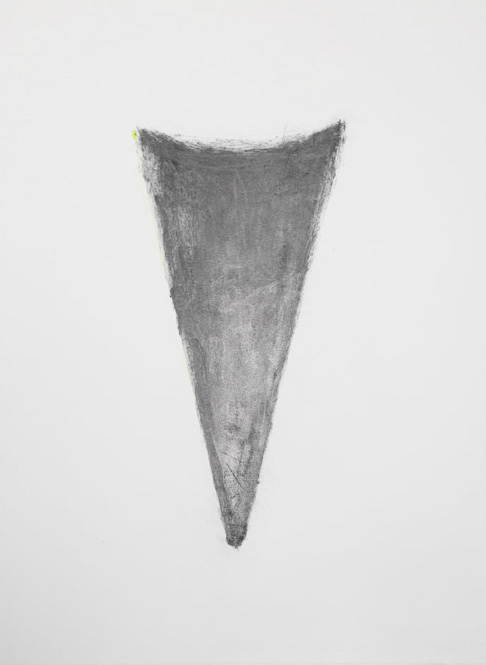
Elizabeth Youngblood (BFA ’73), Cone + Chartreuse, 2020, graphite on paper, 20” x 22” photo: K.A. Letts
In the case of Elizabeth Youngblood (BFA ‘73), the process of art-making takes on the character of ritual, a theme that runs just under the surface in the work of several artists in Story Word Sound Sway. Youngblood employs humble materials–aluminum paint from the hardware store, simple pen and paper, in her incremental journey toward transcendence. Through her use of chance processes and repetition, the artist weaves a statement that is both private and universal.
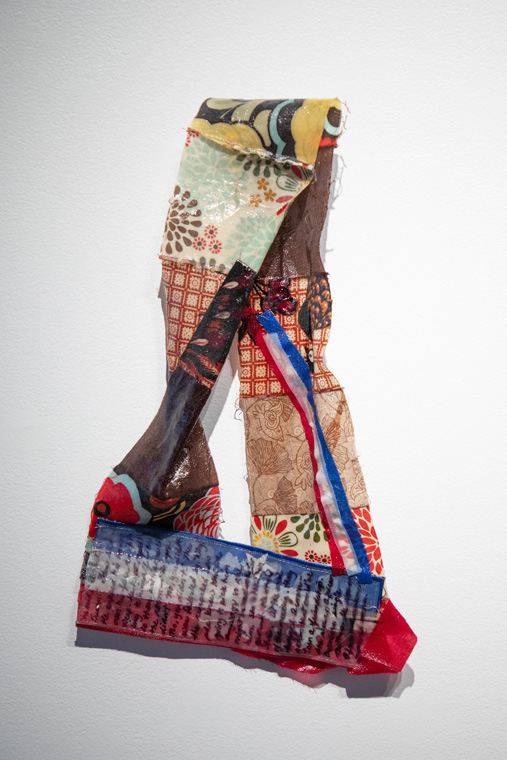
Yvette Rock, Community Conversations, Kahtara and Dwan, 2016-2020, mixed media fiber, 18” x 12” x 2.5” Photo: Nick Beardslee.
Yvette (MFA ’99) Rock’s re-patched fiber pieces are visual metaphors for the spiritual process of healing–her carefully constructed fabric bands in Community Conversations illustrate the laborious one-on-one process of piecing back together the torn social fabric of Detroit. In addition, Rock contributes a video of an accompanying performance set in the Brightmoor neighborhood of Detroit demonstrating her ongoing commitment to the restoration of her community.
Two videos, What the Tide Brought In by Carisa Bledsoe (BFA Interarts ’14) and Sift Shift Swoosh Bods by Levester Williams (BFA ‘13) continue the inward-directed spiritual strands of Story Word Sound Sway in narrative form. Both are hermetic performances that cast the spectator as bemused observer of enigmatic private mysteries.
Perhaps the most clearly community-facing work in Story Word Sound Sway is Schroeder (BFA ‘76) Cherry’s installation employing rod puppets the artist uses to reach out to a broad audience with public service messages both humorous and colloquial. His puppets have performed in museums, libraries, and cultural centers for adults and children across the U.S. in productions such as The Civil Rights Children’s Crusade, Can You Spell Harlem?, and Underground Railroad, Not A Subway. The main character in this particular installation is Khordell, whose casual instructions to and from his fellow puppets include reminders to wear a mask, to not drink disinfectant and to register to vote–all good advice.
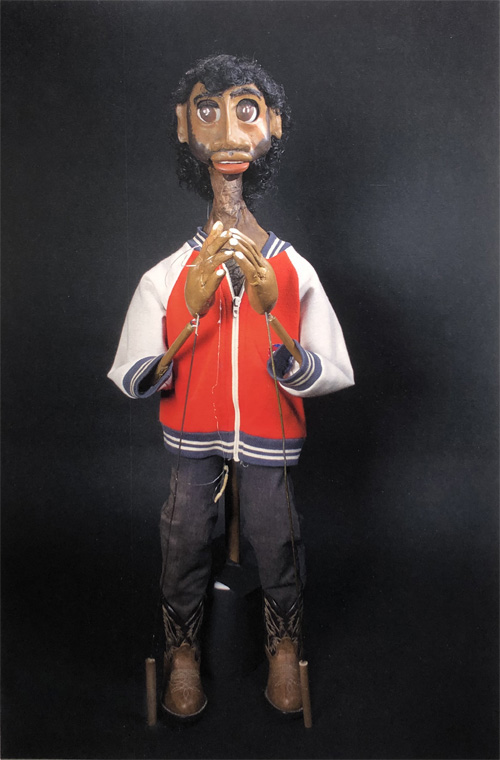
Schroeder Cherry, Dallas Dan, 1992, digital print, 11” x 17” photo: Schroeder Cherry
A room-sized display of ephemera from the Ann Arbor Undercommons, collected by Wes Taylor (BFA ’04), provides extensive documentation of a performance-based collective of Ann Arbor students of color from Huron High School. Dated from 1993 to the present, the materials record the underground hip-hop scene in Ann Arbor, particularly the ongoing activities of the Athletic Mic League. The artists hope that this exhibition will serve as a catalyst to get the process started toward a final documentary product that remains to be defined.
Other event-related installations, like The Collab by Caleb Moss (BFA ’13) speak specifically to the artist’s ongoing involvement in his Detroit community. As community activist and graphic designer, Moss’s entries consist of video documenting community cultural events intended to raise funds for scholarships, and a display of way-finding graphics for The Detroit Department of Transportation. Moss explains, “My work with The Collab has allowed my friends and me to give back to Detroit Public School students while utilizing our varying skills. “The Connection” (our staple event) is a night of art, music, and fellowship that highlights the many talents of local Detroit artists.” The diversity of his work illustrates the multiple routes by which art–and artists–can find a way into the cultural ecosystem of a city.
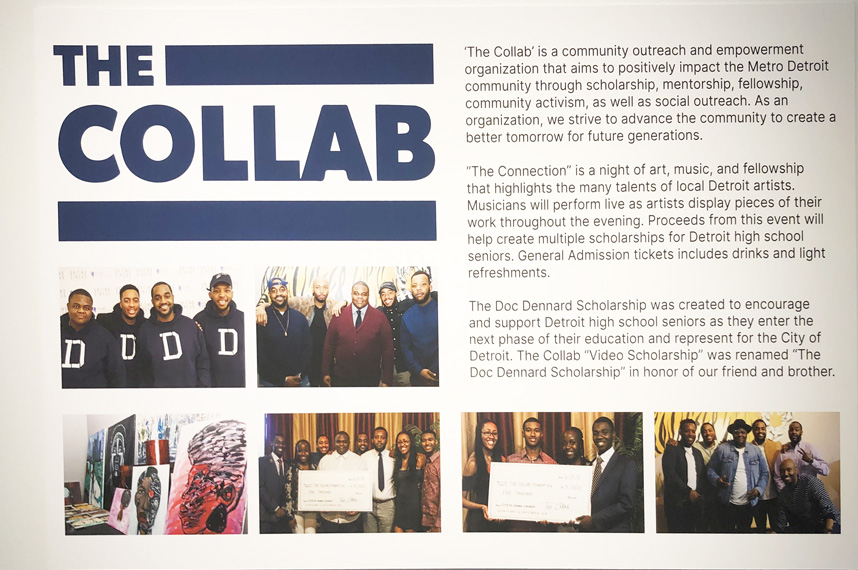
Caleb Moss, The Collab, 2020, Installation detail, poster. Photo: K.A. Letts
The curators describe Story Word Sound Sway as “research-driven and collaborative… a document and documentation… an analysis, a celebration, a critique.” Co-Curator Jennifer Junkmeier-Khan goes on, “The artists tell stories, use words, create and transmit sounds; physically sway in their work and sway “us” with their ideas.” In the process they have also illustrated a more private and often unseen struggle by artists to contribute to their environment while managing to live a creative life in the arts. They are part of a cultural community that, like dark matter, is invisible but essential.
Artists in Story Word Sound Sway: Carisa Bledsoe (BFA Interarts ’14), Schroeder Cherry (BFA ’76), Elshafei Dafalla (MFA ’08), Masimba Hwati (MFA ’19), Caleb Moss (BFA ’13), Senghor Reid (BFA ’99), Valencia Robin (MFA ’08), Yvette Rock (MFA ’99), Wes Taylor (BFA ’04), Levester Williams (BFA ’13), and Elizabeth Youngblood (BFA ’73)
Penny Stamps Gallery is open during limited hours to holders of the MCard. For more information go here.
This review is re-printed with permission from the Ann Arbor District Library’s online culture magazine Pulp. (Editor: Christopher Porter)
